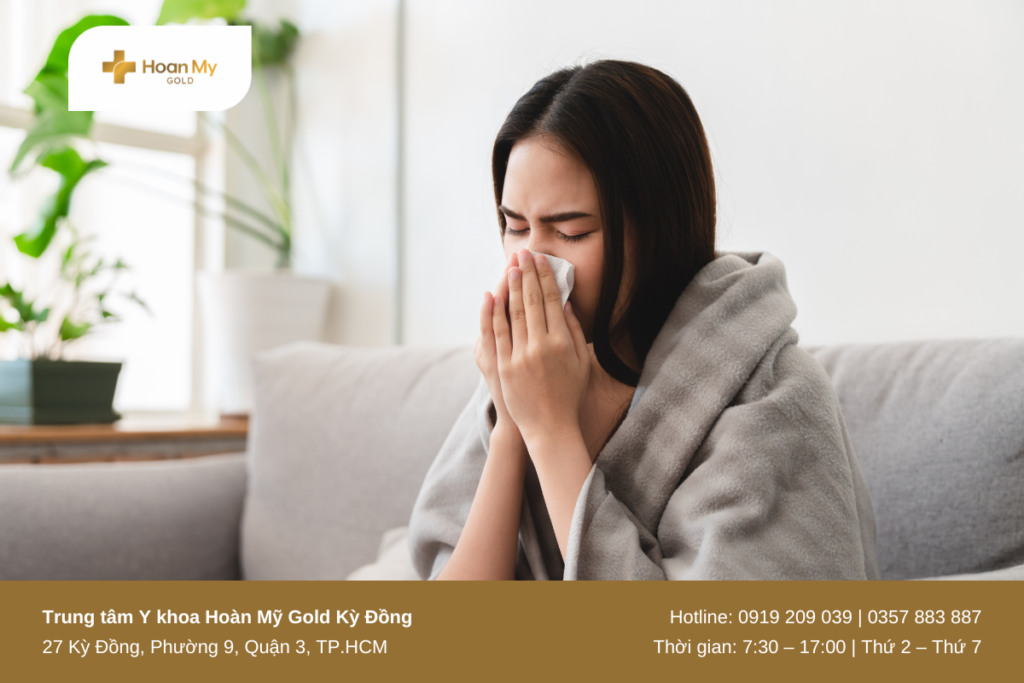Seasonal Flu: What You Need to Know to Protect Your Health
Article Table of Contents
Seasonal flu is an acute respiratory infection caused by the influenza virus, which spreads rapidly within communities. While most cases resolve on their own, certain high-risk groups – including young children, the elderly, and individuals with underlying health conditions – are more susceptible to severe complications.
According to the US Centres for Disease Control and Prevention (CDC), there are approximately 9 to 45 million flu cases worldwide each year, with over 61,000 deaths due to complications. Raising awareness about seasonal flu – including recognising symptoms, prevention methods, and treatment options – is essential to safeguarding both individual and public health.

Seasonal flu and the common cold share similar symptoms but have different levels of impact. Source: Internet
1. What is seasonal flu?
Seasonal flu is an acute viral infection caused by influenza A (H1N1, H3N2) and influenza B viruses. The infection spreads easily, primarily through respiratory droplets expelled when an infected person coughs or sneezes, or by touching contaminated surfaces.
Flu outbreaks are most common in autumn and winter, when cold temperatures and high humidity create favourable conditions for viral transmission.
2. Symptoms of seasonal flu
Flu symptoms typically develop 1 to 4 days after exposure to the virus and may include:
- High fever (usually above 38°C).
- Headache, fatigue, muscle and joint pain.
- Dry cough, sore throat, and runny nose.
- Chills and excessive sweating.
- In some cases: conjunctivitis (red eyes), diarrhoea, and nausea.
Note: Cold and flu symptoms can be similar, but flu usually causes higher fever and more severe fatigue.
3. Who is at risk of severe complications?
Although flu symptoms are usually mild, certain groups face a higher risk of complications such as pneumonia, respiratory failure, or even death. These high-risk groups include:
- Pregnant women.
- Children under 5 years old.
- Adults over 65 years old.
- Individuals with chronic conditions such as diabetes, heart disease, lung disease, or weakened immune systems.
- Healthcare workers and those frequently exposed to infected individuals.

Getting a flu vaccine is an effective preventive measure. Source: Internet
4. Effective ways to prevent seasonal flu
To reduce the risk of infection and transmission, the following preventive measures should be observed:
- Get an annual flu vaccination: This is the most effective method of prevention, significantly reducing the risk of infection and severe complications.
- Wear a face mask when going outside, especially in crowded places.
- Wash your hands regularly with soap and water or use an alcohol-based hand sanitiser.
- Avoid close contact with infected individuals and refrain from touching your eyes, nose, and mouth with unwashed hands.
- Keep your body warm, eat a nutritious diet, and take vitamin C to strengthen your immune system.
- Maintain a clean-living environment, disinfect frequently touched surfaces, and ensure good ventilation.
5. When should you see a doctor?
Most flu cases resolve within 5 to 7 days, but medical attention is necessary if you experience:
- A high fever above 39°C that lasts more than 3 days.
- Difficulty breathing, chest pain, or rapid breathing.
- Extreme fatigue or confusion.
- Severe nausea and vomiting, leading to dehydration.
6. How is seasonal flu treated?
Currently, there is no specific cure for flu, but the following measures can help relieve symptoms and speed up recovery:
- Rest, stay hydrated, and eat nutritious foods.
- Take fever-reducing medication if necessary.
- Gargle with saltwater and keep warm.
- Do not take antibiotics, as they are ineffective against viruses.
- Antiviral medication should only be used under a doctor’s prescription.
Why should you not self-medicate with antiviral drugs?
Antiviral flu medication is prescribed for patients with complications or high-risk factors and should not be taken without medical advice. Unsupervised use can lead to drug resistance, unwanted side effects, and unnecessary financial costs.

Resting, keeping warm, and staying hydrated can help alleviate flu symptoms. Source: Internet
7. How to reduce the spread of seasonal flu
Flu is mainly transmitted through respiratory droplets from coughs, sneezes, or contaminated hands. To minimise the spread, follow these precautions:
- Cover your mouth and nose with a tissue or elbow when coughing or sneezing.
- Dispose of used tissues immediately and wash your hands thoroughly.
- Wear a face mask if you have flu symptoms to prevent infecting others.
- Avoid public places if you are unwell.
Seasonal flu is a common respiratory infection but can lead to serious complications if not properly managed. Getting vaccinated, maintaining good personal hygiene, and following preventive measures are the best ways to protect yourself and your loved ones.
If you develop severe symptoms, seek immediate medical attention at the nearest healthcare facility.
References:
- Ho Chi Minh City Department of Health. Centre for Disease Control. Q&A on seasonal influenza.
- General Department of Preventive Medicine, Ministry of Health. Proactive prevention of seasonal influenza.
---
HOAN MY GOLD KY DONG MEDICAL CENTRE
Hotline: 0919 209 039
Address: 27 Ky Dong, Ward 9, District 3, HCMC
Working Hours: Monday – Saturday | 7:30 – 17:00
Fanpage: https://www.facebook.com/hoanmygoldkd
Zalo: https://zalo.me/1806744790268771257
Share




































